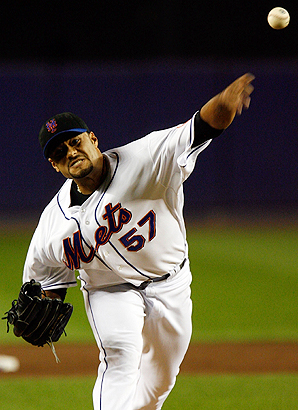When Mets needed him most, Santana did what he always does
Forunately for Santana and the Mets' traumatized fans (98 percent of whom deemed Tuesday's game a must-win in a poll taken during the game by SNY, the Mets' television station), there is no surer thing in baseball than Santana in the second half, and Mets manager Jerry Manuel intended to bet big on him. Before the game, Manuel asked his ace how many pitches he was good for. Santana said if the weather was cool, he'd be able to throw 225. "I told him I'd wear a sweater to prove it was cool," joked Manuel.
The game-time temperature was 65 degrees, but things were significantly hotter for the Mets as Santana prepared to face the Cubs. Having watched their NL East deficit grow to 2½ games and their wild-card lead shrink to a single game, the Mets seemed to be in full-on meltdown mode. And then Santana, as cool as a two-time Cy Young winner should be, strode to the mound and, as he has done so often this season pulled the Mets back from the brink of destruction once again. By the time he left eight innings later, he had fashioned another stellar outing: eight innings, two runs, seven hits and 10 strikeouts. When he reached the dugout, Manuel exaggerated only slightly, telling him he was at 220 pitches. "I asked him for 250," Johan said later.
Instead, Manuel made sure Santana's night was over, but not before he had thrown a career-high 125 pitches, pitched the Mets to a 6-2 win that stopped their losing streak at three and taken another step toward validating both his standing as the game's best pitcher of the past five seasons and the Mets' massive nine-figure investment in him.
"Every time we've needed him in the second half, he's delivered," said Manuel afterward. "We had to win that game tonight. No question about it."
"It seems like every time I'm out there it's really important. We're always either losing or trying to stop a losing streak," Santana said. "I know that every game from here on out is important. That's what I'm here for. That's what I was looking forward to [when I came here]."
Indeed, for all the talk about the Mets' horror show of a bullpen, it was poor starting pitching, perhaps more than anything else, that caused their historic demise a season ago (only once in their 1-6 nosedive in the season's final week did a starting pitcher make it past the seventh inning). Santana was brought in at the cost of four prospects and nearly $140 million to change that. And while the rest of the pitching staff has been inconsistent at best and disastrous at worst, Santana has been, as the title of the song that blared over the Shea Stadium speakers as he took his warmup pitches suggested, supernatural. He is now 8-0 with a 2.26 ERA in 15 starts since early July, and four of those wins have followd a Mets defeat.
Perhaps more impressive than his performance Tuesday was the fact that he did not have his best stuff. "I talked to him before the game and he said he didn't feel that good," said Mets catcher Ramon Castro. Sure enough, the Cubs pounced for five hits and two runs in the first three innings. But from then on, Santana quickly turned into the pitcher the Mets so desperately needed, allowing just two hits and no runs while striking out six over his final five innings. "That's what makes him special," Mets third baseman David Wright said. "A lot of guys have similar if not better stuff, but I can't think of anyone consistently better than he is."
Few are as durable, too. After Tuesday's outing, Santana ranks second in the National League in both innings (225.1) and pitches thrown (3,481). Much has been made this season of the drop in his velocity -- and the radar gun readings on his fastball often failed to top 91 or 92 mph against the Cubs -- but Santana is able to thrive on location and a filthy changeup that players refer to as a "Bugs Bunny" change for the cartoonish way it dances toward the plate. Santana uses that pitch to maximum effectiveness with two strikes; on Tuesday, with the life on his fastball fading in the late innings, he got three of his last four strikeouts on changeups.
Such efficient use of his arsenal is what enables Santana to throw so many pitches without hurting himself or his team's chances at victory. As a consequence, he is always sure he can get batters out and is reluctant to surrender the ball. "I want to make the first pitch and the last," he said. "That's my mindset."
So it was that on an evening where Shea Stadium fans were inundated with '70s flashbacks between every inning that Santana turned back the clock and delivered a lengthy performance worthy of the workhorse starters of generations ago.
Santana's work is not finished, of course. He is scheduled to start the Mets' regular-season finale against the Marlins on Sunday, and will be their ace if they reach the playoffs, a possibility that seemed much more real as Tuesday came to an end. Asked later if he had considered removing Santana after seven, and saving his ace for Sunday, Manuel said, "If you're concerned about saving someone for something, it might not come. Besides," he added, smiling as only an optimist can. "He might not have to pitch on Sunday."





